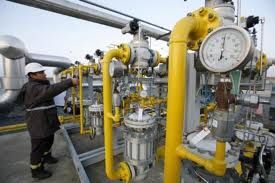
The discovery of gas fields in the East Mediterranean has created threats and promises to countries in the Levant basin as other countries or regions might get involved because of
the political and economic nature of the disputes that might erupt.
Natural gas discoveries in the East Mediterranean are not new. British Gas (BG) signed an agreement with the Palestinian Authority in November 1999 to explore for gas in the entire offshore Gaza area, develop any discovered field and construct a pipeline to Gaza.
BG drilled two wells and estimated the reserves of its find to be 1.4 trillion cubic feet (TCF) with the possibility that reserves can be much higher.
But the development could not be done as Israel prevented any agreement to buy the gas or have it transported to Egypt or Gaza on the ground that the proceeds would finance "terror" but actually for an opportunity to claim the field for itself at a later date.
Israel itself discovered some fields close to the Gaza zone and production in 2008 was 48 BCF but thought to be declining, which prompted Israel to import gas from Egypt in a much criticised deal. Israel's natural gas reserves at the time were estimated at 1.5 TCF or about 16 years' worth at current output levels.
Dramatic development
But the more dramatic development is the discoveries in the north, west of Haifa where in 1999 the American company Nobel Energy discovered Tamar field of 8.4 TCF reserves and later a small Dali field of 0.5 TCF. Then in October 2010 the first exploratory well further west of Haifa in what Israel claims to be its exclusive economic zone (EEZ) a massive field was discovered and named Leviathan after the Biblical sea monster The reserves in this field are now estimated at 16 TCF and commentators said that it is "giving Israel a new economic advantage over its enemies".
However, the new discovery immediately raised Lebanon's concern as the discovery is thought to be in Lebanon's EEZ in full or at least partially, contrary to Israel's claim that the field is in its EEZ. This situation is now internationalised as Lebanon submitted maps to the UN to substantiate its claim and Israel in a provocative unilateral action set the demarcation of its northern maritime border with Lebanon.
Lebanon, at all levels, is serious about following up its rights as President Michel Sulaiman said "no one should doubt Leban-on's determination and its readiness to defend its territory, its land and sea borders and protect its right and its natural wealth by all available and legitimate means", a position echoed by many groups.
While Israel's foreign minister Lieberman said "we won't give an inch", Josh Kaplan, a researcher said on IsraelStrategist.com that "in the end, Lebanon's border claims may actually have some degree of substance based on internationally recognized law". The question is when did Israel abide by international law? The UN Law of the Sea of 1994 and its tribunal looking into disputes is expected to look into this question.
The situation was further inflamed when in December 2010 Israel and Cyprus signed an agreement which delineated the borders between them without involving Lebanon. At the same time Cyprus started its own exploration programme in coordination with Israel.
These developments drew Turkey into the conflict. Turkey, says Cyprus should not exploit resources until it resolves a stand-off with its Turkish-speaking north where the UN is trying to resolve for years.
The Turkish Prime Minister Recep Tayyib Erd-ogan recently said, "The Greek Cypriot administration and Israel are engaging in oil exploration madness in the Mediterranean."
And that Turkey would carry out its own energy surveys with the Turkish Cypriot state — with war-ships escorting it if necessary. Turkey did in fact deploy a seismic research vessel with gunboat escorts following which Israel scrambled F-15 fighter jets and Turkey sent two F-16 planes to the zone.
The European Commission has called for Cyprus and Turkey to show restraint and work toward a settlement. But this situation could become more complicated if other countries such as Greece, Russia and the US are drawn into the conflict.
Source: Gulf News
We use cookies to improve your experience. By continuing to use our site, you accept our Cookies, Privacy Policy,Terms and Conditions. Close X